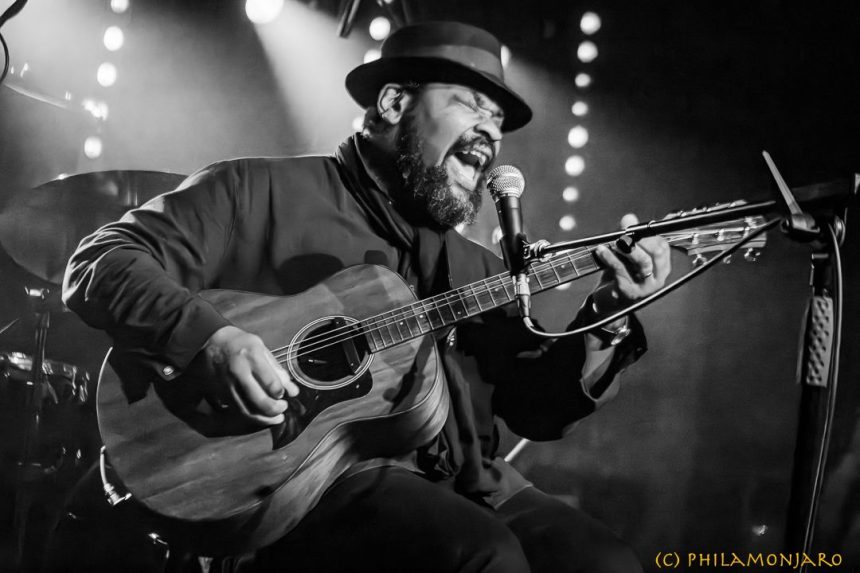Questions for the doctor after a kitchen house call.
Performing a short opening set before Robert Finley at Manchester’s Blues Kitchen, Tom Attah served up a wildly inspired set of front porch blues. With just an acoustic guitar, a bigger-than-life voice and a charismatic personality, he lit the room.
In a conversational ease, Attah shared with the audience: “Yeah, I am from the south, the south of England.” Not quite the delta origins that one expects but no doubt authentic.
It’s fascinating looking at how meanings and uses of blues music change in different times and different places and going into the future.
Dr. Tom Attah
Course Leader for BMus Popular Music Performance at Leeds Arts University, this bluesman approaches his roots music at all levels. The Venn diagram between technology, blues, society, and performance.
Here Attah shares his thoughts and background.
When did you first listen to the blues? And what stands out as your earliest memories of you connecting with the blues?
I heard Smokestack Lightnin’ on the Television in the early 1980s and was hypnotized by it. It didn’t sound like anything else I had ever heard, and it just sounded – right. I loved the simplicity of it and the rhythm and the repetition. And Wolf’s VOICE! It was dangerous and comforting at the same time. Then I heard (Muddy Waters’) Hard Again, and that was IT.
Who are the top blues artists who influenced you the most?
Anyone that can tell a story with their voices or their music, anyone that has feel. So Muddy Waters and his guitar players, Son House, Robert Johnson, Hubert Sumlin and a lot of the ’60s electric blues players from the UK and US. I love early Fleetwood Mac. There are amazing younger players living now too. But there’s blues in everything; it’s not just blues artists that sound bluesy. You can find it in jazz, electronica, orchestral music, folk, and rock.
Which blues styles reflect your playing? Piedmont? Chicago Blues? Delta Blues? Others?
When I am playing it’s just me so I need to set up solid and flexible rhythms and grooves so that the audience can feel the pulse. Chicago and Delta blues are great for that heavy-rhythm. Both styles are very self-contained and you can make great use of dynamics so that the audience can lean into the music with me. It’s like a machine that fires up. Sometimes it’s slamming; sometimes it’s purring along.
What specifically is your PhD in? How do the blues inform your academic work?
My PhD is in cultural theory and popular culture. Specifically, I look at the way technology affects cultural practice. In other words, what effects do different technologies have on blues music and blues culture? What happened to blues music when it was first recorded? What does the internet mean for blues audiences and scholars? It’s fascinating looking at how meanings and uses of blues music change in different times and different places and going into the future.
How is the blues fairing today with young musicians and students? Is there either widespread or passionate interest?
Musicians will always play anything that allows them to feel and express themselves; that’s the joy of blues music. You can bring yourself to it and express what you want to say in music and rhythm. My students understand that blues music is one of the dominant feed styles in popular music post-1950, and so it’s always a joy doing those lectures and exploring the music with them every year. We go from the Delta to the Download! It’s great to play them Son House on one side and Larkin Poe on the other. Once they get it, they start bringing me new things!
What blues projects do you currently have in the works?
I’m doing a lot of work with dancers, so keep an eye on my website for dates around that. I am working on an acoustic blues album with Mat Walklate. I’ve just done some blues consultancy for an ITV show that will come out next year – some of my music is in that. More writing will come out soon – busy! There’s also shows and support at the Blues Kitchen which is an amazing venue. Check the website!
Are there any questions that I have not asked that you would want American Blues Scene readers to know?
The blues belongs to you. There are a lot of arguments raging about this, but for me the only condition for playing it is that you feel it and you honor it by giving it your whole attention when you play or dance or listen. The greatest compliment you can pay the old masters is to listen to their work and dance, sing or play it yourself.









